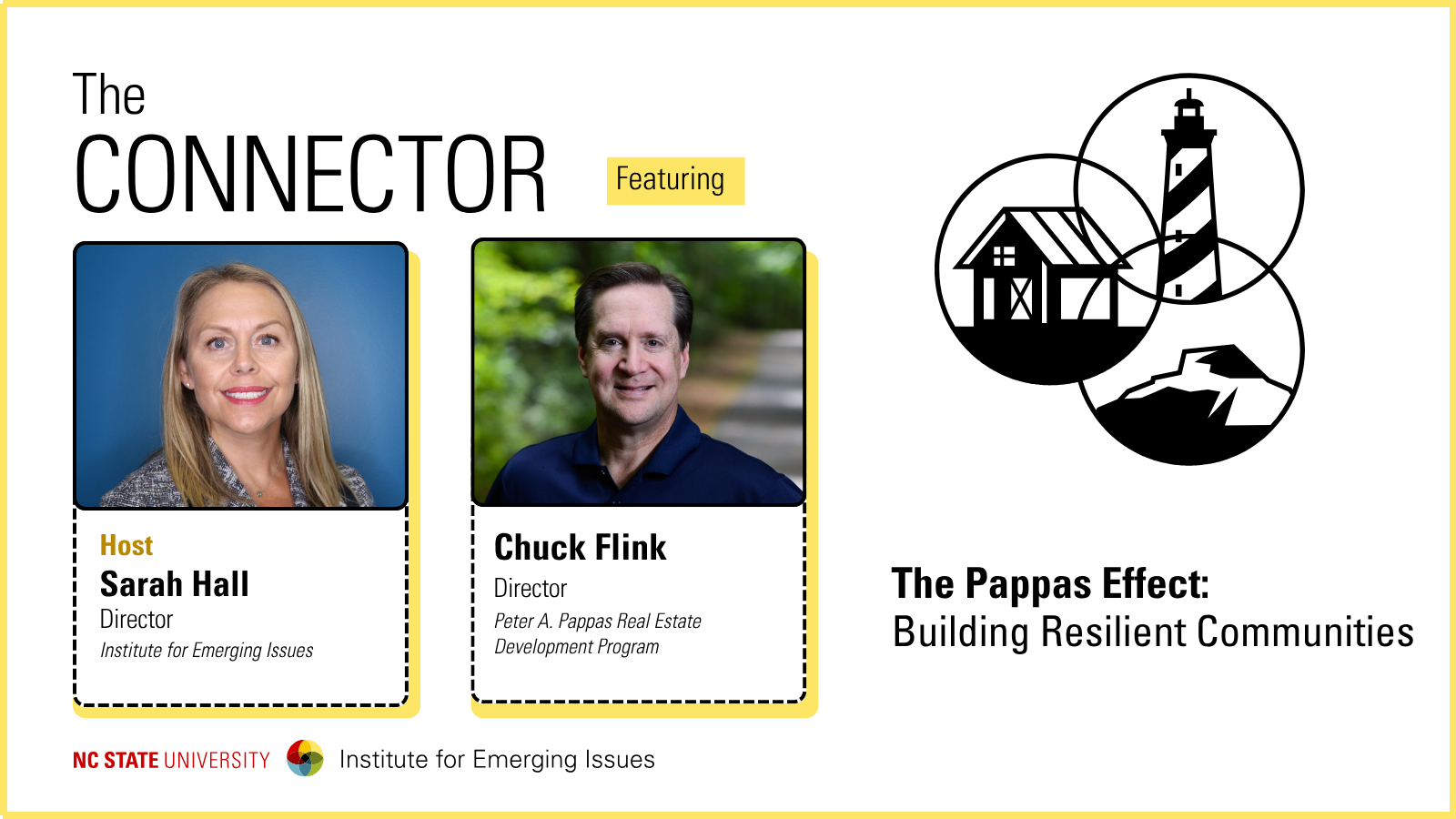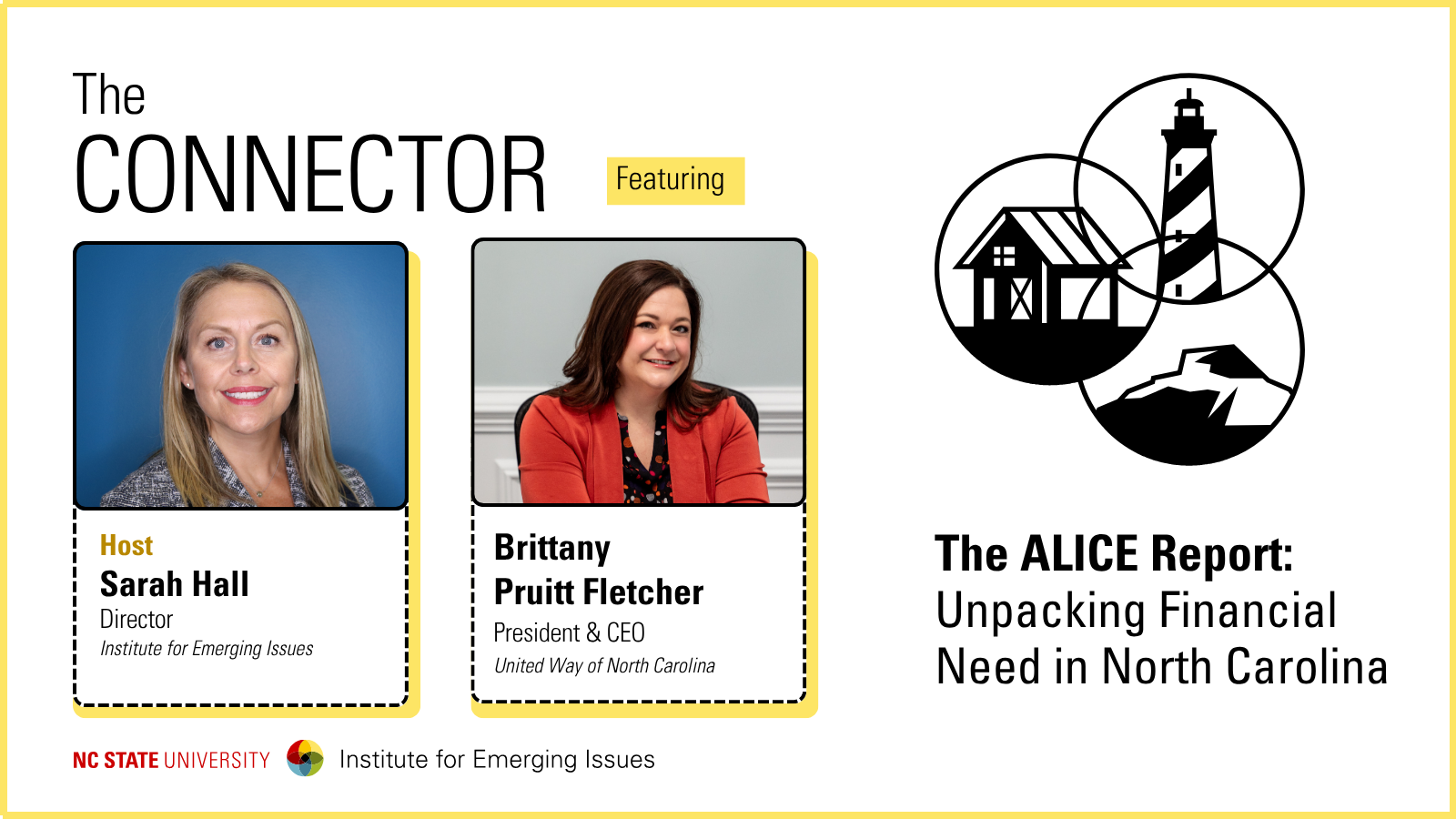How Can K-12 Learning Be Better This Fall?

Summary: Host Leslie Boney, Director, Institute for Emerging Issues, talks with special guests Eric Davis (Chair, State Board of Education), Eliz Colbert, Ed.D., (Executive Director, NC Virtual Public Schools), Terry Stoops, Ph.D., (Director of Education Studies, John Locke Foundation) and Tabari Wallace (Principal, West Craven High School and NC 2018 Principal of the Year) as they discuss the current state of learning within the K-12 space and what will need to happen to ensure students are receiving a high quality education this fall, despite some of the obvious challenges.
*This episode of First in Future was recorded on Thursday, August 12th, and reflects information that was up-to-date at that time.*
View the slides here.
Watch Zoomcast on YouTube.
Listen to the podcast:
NC VPS has been doing this since 2007. What have you learned since then?
Eliz Colbert: First year had 17,000 students enroll – there’s always been an appetite for virtual learning in NC. Technology, courses & programming in 2020 are vastly different from 2007. Top things to look for: class size under 35; feedback is instructive; communication between teacher and student is consistent and frequent; courses are accessible; variety of learning structures (not just a textbook on the screen).
State auditor came out with a report that VPS came up short in some ways. What do you learn from that?
Eliz Colbert: Our external markers on EOGs/EOCs/AP exams are in line with state testing. Learned from the audit to pay attention to teacher’s work to supplement gaps in courses. Rolling out new teacher observation tool and tools to help teachers with instructional practices.
Key tips for teachers for teaching online?
Eliz Colbert: VPS believes in an intensive training program, but NC in a pandemic may not have that luxury. “Your very best classroom teacher may not be your very best online teacher without support and learning.” VPS intends to continue offering free professional development for NC teachers.
What’s the role of a parent in online learning?
Eliz Colbert: VPS believes online learning is for every student, but every student gets a different level of support. That’s where parents are critical. Not too different from face-to-face learning: be involved, ask questions, connect with teacher, participate.
In a recent column, you wrote, “Do we sacrifice education quality for safety, or do we sacrifice safety for education quality?” Is it really either/or?
Terry Stoops: These are the trade-offs we’re faced with. Development of remote learning is still in its infancy. A lot of districts have decided the trade-off of complete safety of families and staff is more important than high-quality, in-school experience. Trade-offs in how we spend money: i.e. tech infrastructure vs. teacher pay raises.
Many don’t have tech they need to get online, which could potentially exacerbate the achievement gap. Why is that so important?
Terry Stoops: This is a challenge every state faces. This is the time for the public sector to mobilize the private sector’s solutions. “And so ensuring that these students have these resources, I think, is absolutely critical. It’s a social justice issue.” To use this as an opportunity to address the achievement gap, we need to fully understand what the problem is – regulatory barriers, etc. Private sector can help us better understand the challenges.
What’s your plan to ensure distance learning works in Craven County this fall?
Tabari Wallace: 25-30% of my students don’t have reliable internet, other than a phone hotspot. Every student has a device, and now we have flash drives so the student can participate synchronously. Educators have been creative to get around tech gap. Seat time does not equal mastery. We know the dos and don’ts from what we learned in the spring.
What other great, creative ideas do you have?
Tabari Wallace: iPads/device + flash drives where teachers record lessons, with different flash drives per week and packets for students to follow along. Focus on each and every child. Canvas – learning management system – translate assignments to paper and pencil.
As chair of the school board – reactions to creative/emerging ideas? How can NC supplement the number of people supporting students?
Eric Davis: Administrators and teachers are students themselves – learning new ways/tools to connect with students and educate. Idea from school board to create NC Education Corps – volunteers (mostly recent college grads) to help students and teachers all across NC. Details forthcoming: patterned after AmeriCorps, Communities in Schools, Teach for America. Contact the State Board of Education for more information.
Reactions to that idea:
- Tabari Wallace: That’s a solution to a problem we have in West Craven County. Have established academic pods where students will meet in small numbers at local locations (businesses, churches) – problem is getting tutors/extra help. “So I am all in! Send them all this way.”
- Terry Stoops: Commend state board for this. Thinking of retired teachers who could help out too.
- Eliz Colbert: Underline the student/teacher relationship. NC Virtual has a successful peer tutoring program – juniors/seniors in HS and freshmen in college.
Concerns folks have had – study showed that when schools closed down, there was a cumulative ripple effect – students were even more behind. Any intervention we can do this fall to help make up for learning loss?
- Tabari Wallace: There has been a gap in learning. When kids get back, we’ll have assessment to identify gaps. Start with that and remediate one day a week.
- Eliz Colbert: The quick fix is not always helpful. However, the teacher knowing the student is always helpful. Be aware of individuals as opposed to where the whole class is – will help with gaps in learning. Personalized learning tailored to each student is a strategy to help – which technology makes easier on the teacher.
- Eric Davis: General Assembly appropriated funds to launch a jumpstart summer program for K-3 students. Need to make transformational, system change – more personalized instruction to students – leverage more technology – and need more teachers and staff to provide that. Funds will be going to school personnel (counselors, etc.), which is an important part in closing the gap.
How do we balance importance of exposure with quality?
Terry Stoops: It’s a long-term challenge. Students differ in the time they need to learn something. Think about time in an individualized way – how we can change the school day and year that better addresses student needs. Shouldn’t have students repeat the grade.
Why is this year going to be a good year in spite of everything?
- Eliz Colbert: Have been inspired by teachers’ commitment to students. It will be different, there will be bumps in the road. We’re in good hands with NC teachers. We’ll learn about blended learning for the future.
- Terry Stoops: We’re rethinking strategies, what school looks like, what the job of the teacher is – leads to greater individualized instruction. We can assess where we’re at and eliminate policies that have inhibited us – forge a new system of public schooling in-tune with students’ needs, business needs, and state needs. NC will be a leader in rethinking what education looks like.
- Eric Davis: Opportunity to think critically about our system. Excited about the idea of NC Education Corps volunteers interacting with students this fall. We can do hard things.
- Tabari Wallace: Out of tragedy comes triumph. We’ve retooled our army of educators and our educative mindset. Ready for the challenge. We can teach digitally or traditionally – we can do anything right now.
- Categories:


